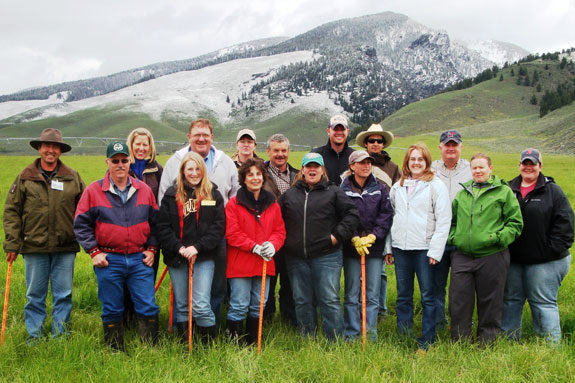The Academy is presented twice annually by University of Idaho Extension faculty, and provides an intensive, hands-on introduction to Management-intensive Grazing (MiG).
The primary focus is on irrigated pasture management and extending the grazing season, and is suitable for all types of grazing livestock.
The June Academy was attended by 16 participants from Idaho, Colorado, Oregon, Washington and Mexico. Over the years the academy has been attended by participants from all of the western states, Canada, Mexico and Venezuela.
This spring’s academy was characterized by unsettled weather including rain on Wednesday and finally snow down nearly to the field plots on Thursday morning. A storm settled in on Wednesday, but the wood stove in the Eagle Valley shop and a little rearranging of the schedule permitted the program to go on pretty much uninterrupted.

The Lost Rivers Grazing Academy is a four-day, hands-on workshop, where the participants engage in a combination of classroom and field experiences to introduce them to the principles and practices of MiG.
Faculty of the Academy include extension educators Chad Cheyney, Scott Jensen, and Shannon Williams, Extension specialists C. Wilson Gray, and Glenn Shewmaker, retired Extension educator James Hawkins, as well as Jim Gerrish, formerly with the University of Missouri Forage System Research Center, a well-known authority on MiG and proprietor of American Grazing Lands LLC. Experienced MiG operators Mike Kossler, and Jerry Elzinga from Eagle Valley Ranch also made presentations.
The program included a combination of theoretical and specific lecture-discussions and field exercises to give participants a combination of education and experience that will permit them to go home and begin to implement MiG principles on their own operations.
During the mornings, presentations were made on principles of pasture management, “graziers arithmetic”, importance of residual, livestock handling, principles of electric fencing, ecosystem function, nutrient cycling, extending the grazing season, pasture economics, goal setting and other relevant subjects.
In the afternoons, the students applied these principles in a series of field experiences, which include specific grazing assignments for the teams, pasture walks to discuss the results of the previous days grazing, trouble shooting electric fencing, evaluating pasture condition, scatology, making and using pasture inventories construction of permanent electric fence and more.

Continental breakfast and snacks were provided during the day. Hearty lunches were provided along with delicious suppers in the Salmon Sacajawea Center with a view of the Continental Divide. Participants have a hard time staying away from the table and are reputed to be able to put on over two pounds a day!
Principles learned during the day were reviewed during evening activities such as the Cow Chip Olympics, Mystery Theater, and LRGA Jeopardy. These activities also provided opportunities for networking and team building.
Participants’ evaluation of the program indicated an increase in knowledge and skills, as well as interest in implementing the principles discussed and demonstrated during the academy. Typical participant comments included:
- “Exceeded my expectations!! I really appreciated the hands-on portion and the helpfulness of the instructors”
- “Met and exceeded! I had really not much idea of what to expect coming into this, and our coworkers who came last year did a horrible job of telling us what we’d do. The BEST training I’ve been to in 5 years.
- “I didn’t have any expectation coming into the Academy, but if I did, this would have greatly exceeded them. Great information (and food!).
Meals were rated 9.75 on a scale from 1 to top of 9.
The Lost River Grazing Academy will be presented again September 14th-17th, 2010, at the Eagle Valley Ranch in Salmon, Idaho. Participation is limited to 20.
Fee includes continental breakfast, snacks, lunches, and 3 suppers, as well as a resource binder valued over $100. Additional participants from the same ranch participate at a reduced rate, without a resource binder.
Alumni may repeat the program for a reduced rate. Many participants return to repeat the Academy, because there is a lot of material covered and because the grass and the people are different every time! FG
For more information or a registration form contact Scott Jensen or 208-896-4104. In Marsing, Chad Cheyney at 208-527-8587. In Arco or go to Lost Rivers grazing academy.
PHOTOS
TOP: Participants of the academy included: Rear (Left to Right) – Rafael Jimenez, Alayne Bickle, Barrett McClure, Claudia Ingham, David Andreason, Marcus Nichols, Jose Jimenez, Benton Glaze; Front (Left to Right) – Joe Brummer, Jestine Hensley, Marcie Cleaver, Sandra Porter, Megan Satterwhite, Marcie Meyers, Anna Marie Magnochi
MIDDLE: Marcie Cleaver (Lacey, Washington) points out problems with the fence to UI Extension specialist Benton Glaze (Twin Falls, Idaho)
BOTTOM:
Barrett McClure (Jerome, Idaho) gets a shocking practical experience while trouble shooting temporary electric fencing while teammates Marcie Meyers (Renton, Washington) and Jose Jimenez (Chula Vista, California) cheer him on!
Information and photos provided by Charles Cheyney, University of Idaho Extension Educator









